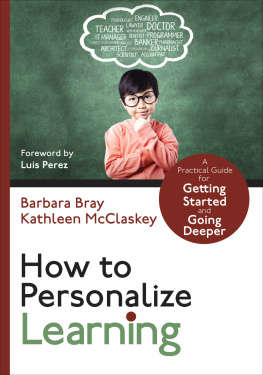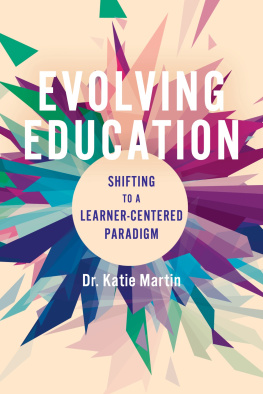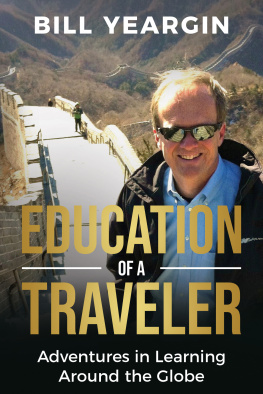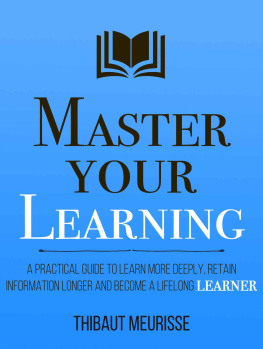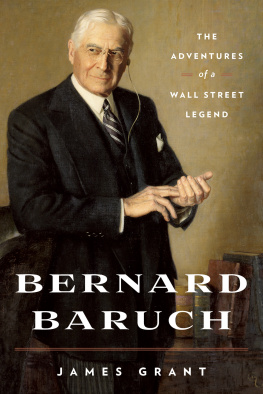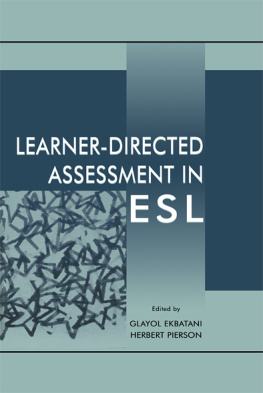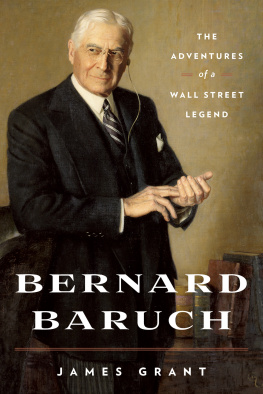Adventures in Self-Directed Learning
A Guide for Nurturing Learner Agency and Ownership
Bernard D. Bull
Adventures in Self-Directed Learning
A Guide for Nurturing Learner Agency and Ownership
Copyright 2017 Bernard D. Bull. All rights reserved. Except for brief quotations in critical publications or reviews, no part of this book may be reproduced in any manner without prior written permission from the publisher. Write: Permissions, Wipf and Stock Publishers, 199 W. 8th Ave., Suite 3, Eugene, OR 97401.
Wipf & Stock
An Imprint of Wipf and Stock Publishers
W. th Ave., Suite
Eugene, OR 97401
www.wipfandstock.com
paperback isbn: 978-1-5326-1584-9
hardcover isbn: 978-1-5326-1586-3
ebook isbn: 978-1-5326-1585-6
Manufactured in the U.S.A. June 15, 2017
Table of Contents
We hold these truths to be self-evident, that all men are created equal, that they are endowed by their Creator with certain unalienable Rights, that among these are Life, Liberty, and the pursuit of Happiness.
The United States Declaration of Independence
Preface
I want that for my child! Less than a year after my daughters birth, I visited my first project-based learning school, George D. Warriner High School in Sheboygan, Wisconsin. This was near the beginning of a decade-long exploration of diverse models of K- and higher education institutions. I wanted to expand my sense of what is possible in teaching and learning, test my assumptions, and more fully consider how we can create far more engaging, humane, and inspiring learning communities. Only a week earlier, I reached out to the principal of this school, and he quickly welcomed me to visit. I observed the students for a short time and spent an hour or two talking with the principal and one of the other teachers.
What I saw and heard stirred my excitement about the possibilities. These were typical high school students who learned the power of taking greater ownership for their learning, gaining a voice in shaping what and how they learn, and the results impressed me. As with any school, it was a work in progress, but it was nonetheless inspiring. There were no traditional classes. Instead, students shared a common course in st century skills, but the rest of their learning happened in the form of self-directed student projects, with the guidance and coaching of a teacher.
As I drove home after this visit, I yearned for a school like this for my daughter one day. I wanted a school where students did not just sit in rows and learn to follow instructions, jump through academic hoops, memorize content, strive to get good grades, and learn to be compliant. I wanted a school that would nurture curiosity, a love of learning, a deep and growing sense of agency, ownership, engagement in life and the world, and a strong set of guiding convictions. I wanted a school focused upon helping my daughter and every other student engage in what Paulo Friere called, the practice of freedom. As Richard Shaull explains in the introduction to Paulo Frieres classic text, Pedagogy of the Oppressed :
There is no such thing as neutral educational process. Education either functions as an instrument that is used to facilitate the integration of the younger generation in the logic of the present system and bring about conformity to it, or it becomes the practice of freedom, the means by which men and women deal critically and creatively with reality and discover how to participate in the transformation of their world. The development of an educational methodology that facilitates this process will inevitably lead to tension and conflict within our society. But it could also contribute to the formation of a new man and mark the beginning of a new era in Western history.
I wanted a school that was less about teaching conformity and more about empowering my daughter and others to find and cultivate their voice. I sought a place where children could learn the freedom, responsibility, and importance of making choices. I dreamt of a classroom where students take pride and ownership in their work, where they engage in inspiring and relevant learning, where their work and learning is the center and not the teachers performance.
As you will read in the forthcoming chapter, I discovered some of these ideas on my own as a teenager, but I always wondered if there might be a better and more systemic way of helping young people discover the power of being increasingly self-directed learners. My study and visit of such schools confirmed that there is a better way. In fact, there are countless better ways. It just depends upon the openness of teachers, students, and others to embrace self-directed learning as an important and increasingly significant part of what happens in school.
My journey started with visiting a few schools like George D. Warriner, but it quickly expanded to a national and even international search. I visited some schools, and I studied even more through primary and secondary resources. I read countless books, interviewed leaders and founders, and in a matter of two or three years, something became apparent. These empowering communities where students learn to shape and own what they learn are far more prevalent than I ever imagined. They are not simple products of an overly utopian imagination. They actually exist. Student learn and thrive in schools committed to self-directed learning, as well as in classrooms where teachers strive to create space in an otherwise traditional school culture to give students an unforgettable taste of taking ownership for their learning. The results might not be documented on formal assessments and standardized tests because few people in education are attempting to measure these sorts of elements. Nonetheless, it is alive and well.
In this book I am going to make a case for self-directed learning as important for individuals but also for our society. How long can a democracy survive if people only learn to comply and they do not learn to speak up about what matters to them and to take ownership for what they accomplish and what happens to them? If students go through years of school where the dominant message is that you get ahead by being submissive and compliant, then I fear that we are doing our students and our communities a disservice.
I wrote about this topic in a chapter about nurturing agency in my book, What Really Matters? Ten Critical Issues in Contemporary Education , but this book is a chance for me to expand that conversation in way that will give classroom teachers, homeschooling parents, and others a starting point for action. I am convinced that nurturing agency is among the more critical issues in education today. It ventures into matters of access and opportunity. It touches upon issues of individual rights and responsibilities. In addition, it is rooted in the US Declaration of Independence and our concept of inalienable rights. This new book, Adventures in Self-Directed Learning , is an expansion of that one chapter in the prior book, an opportunity to explore the why of self-directed learning as well as the how of nurturing it.
While my visits to and study of many inspiring alternative schools continue to serve as a vivid illustration of what is possible on a larger scale, I also write this book as a realist. I do not expect every family and community to reinvent school to be more fully student-centered. I realize that standardized tests are not disappearing anytime soon, nor are national and state standards that shape much of the content that students learn. At the same time, none of this means that we cannot work within our existing schools to better nurture self-directed learners. While we might be able to make much faster progress by creating new schools built around these concepts, we can also use our existing classrooms and schools. We can learn to help students take ownership, learn the power and importance of their voice, start to serve as co-designers of their learning, and to play more of a direct role in deciding what, how, and why they learn. We can do this in any classroom, granted that the teacher and students are willing to give it a try.




